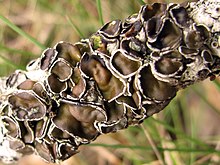Parmelina quercina
| Parmelina quercina | |
|---|---|

| |
| Scientific classification | |
| Domain: | Eukaryota |
| Kingdom: | Fungi |
| Division: | Ascomycota |
| Class: | Lecanoromycetes |
| Order: | Lecanorales |
| Family: | Parmeliaceae |
| Genus: | Parmelina |
| Species: | P. quercina
|
| Binomial name | |
| Parmelina quercina | |
| Synonyms[1] | |
Parmelina quercina is a species of foliose lichen in the large family Parmeliaceae. It is found in continental Europe.
Taxonomy
[edit]The lichen was first scientifically described by German botanist Carl Ludwig Willdenow in 1787, as Lichen quercinus.[2] Finnish lichenologist Edvard August Vainio considered it better classified in Parmelia,[3] which at the time was a large genus that contained most foliose, or so-called "parmelioid" lichens. Mason Hale transferred it (and 40 other former Parmelia species) to the newly circumscribed genus Parmelina in 1974.[4]
In 2007, molecular phylogenetic analysis was used on specimens collected from around the world, which showed that the collection of specimens being called Parmelina quercina actually represented four distinct species. Not only were they genetically distinct, but they had distinctive morphological characteristics as well as unique geographic distributions. In addition to Parmelina carporrhizans (oceanic Europe and Macaronesia), and Parmelina quercina, now restricted to continental Europe, two new species were proposed: Parmelina coleae for North America, and Parmelina elixii for Australia.[5] The latter species has since been transferred to Austroparmelina.[6] Because Willdenow's original specimens of Parmelina quercina, collected from "im Thiergarten & prope Tegel" in Berlin, have been lost, a neotype from Germany was designated for the taxon in 2009.[7]
References
[edit]- ^ "Synonymy: Parmelina quercina (Willd.) Hale, Phytologia 28(5): 483 (1974)". Species Fungorum. Retrieved 5 February 2022.
- ^ Willdenow, C.L. von. (1787). Florae Berolinensis Prodromus (in Latin). Berlin: Impensis Wilhelmi Viewegii. p. 353.
- ^ Vainio, E.A. (1899). "Lichenes in Caucaso et in peninsula Taurica annis 1884–1885 ab H. Lojka et M.A. Dechy collecti". Termeszetrajzi Füzetek (in Latin). 22: 269–343.
- ^ Hale, Mason E. (1974). "Bulbothrix, Parmelina, Relicina and Xanthoparmelia, four new genera in the Parmeliaceae". Phytologia. 28 (5): 479–490.
- ^ Argüello, Arturo; Del Prado, Ruth; Cubas, Paloma; Crespo, Ana (2007). "Parmelina quercina (Parmeliaceae, Lecanorales) includes four phylogenetically supported morphospecies". Biological Journal of the Linnean Society. 91 (3): 455–467. doi:10.1111/j.1095-8312.2007.00810.x.
- ^ Crespo, Ana; Ferencova, Zuzana; Pérez-Ortega, Sergio; Elix, John A.; Divakar, Pradeep K. (2010). "Austroparmelina, a new Australasian lineage in parmelioid lichens (Parmeliaceae, Ascomycota)". Systematics and Biodiversity. 8 (2): 209–221. doi:10.1080/14772001003738320. S2CID 84715679.
- ^ Argüello, Arturo; Crespo, Ana; Hawksworth, David L. (2007). "Neo- and epitypifications to fix the application of the names Parmelina carporrhizans and P. quercina". The Lichenologist. 39 (4): 397–399. doi:10.1017/s0024282907007013. S2CID 86309245.
